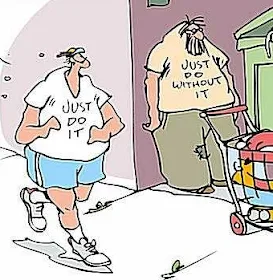 |
| New York Cold water flats, Will Eisner |
"I saw the best minds of my generation destroyed by madness, starving hysterical naked,
dragging themselves through the negro streets at dawn looking for an angry fix,
angel-headed hipsters burning for the ancient heavenly connection to the starry dynamo in the machinery of night,
who poverty and tatters and hollow-eyed and high sat up smoking in the supernatural darkness of cold-water flats..."
So begins Allen Ginsberg's epic poem Howl, his wild poetic record of the military/industrial complex steamrolling over everyone, and everything in its path. But it is also an ode to freedom and happiness, and the sacrifices that must be made to realize them. Sacrifices like going without toilet paper, or new shoes, or living in a flat without unlimited running hot water.
Ever since reading Howl I have been taken by the idea of cold-water flats. It is difficult for most of us in developed nations to imagine living in a home that does not have full time running hot water, and where the bathroom is a small closet with just a toilet in it. Not only do today's huge homes have ample supplies of hot, running water, but they also often have a separate full bathroom for every person in the family.
In most industrialized countries, cold water flats are (officially) illegal. Along with their passing went a whole way of living frugally and appreciating the little things in life. I am not romanticizing the 'good old days' - life in a cold water flat would be challenging at times. However, it is entirely possible to live in such simple surroundings and still be happy.
An ex-tenant of a cold water flat remembered his experience fondly:
"My mom bathed us once a week whether we needed it or not. Because we were small kids, my two sisters would bathe at the same time, and then I would be bathed in the same water because it was still warm. We tried to use as little gas as possible with the water heater....anyway, my sisters didn't get very dirty in those days.Perhaps we were happier in cold water flats than we are today in 3500 sq. ft. designer homes. Back then 'sacrifice' was not necessarily seen as a bad thing. It was good, character-building stuff to "give up, abandon, relinquish, let go, do without, renounce, forfeit, and forgo" certain decadent luxuries. How things have changed.
We had an ice box and bought ice from the ice man for 15 cents or so. The ice lasted a couple of days. When we got holes in our shoes my mom would line the inside of our shoe with cardboard to cover the hole until she saved enough money from her tight budget to buy a new pair for us. We never considered ourselves poor." - source
People no longer have an appreciation for the simple things. That has been replaced with high expectations, pampered entitlements, and an acquisitiveness formerly only seen in insane monarchs with delusions of grandeur.
Only a few decades ago we experienced more happiness with less stuff. We must achieve that state again, and soon. Currently it is a race between epidemic levels of depression and environmental/financial/social collapse, as to what our ultimate demise will be.
We need to get our bloated expectations in check, and relearn the lean-living, frugal ways of our grandparents and great-grandparents. We may find we are happier in the end.
Give me a cold water flat over a mini-mansion any day.















